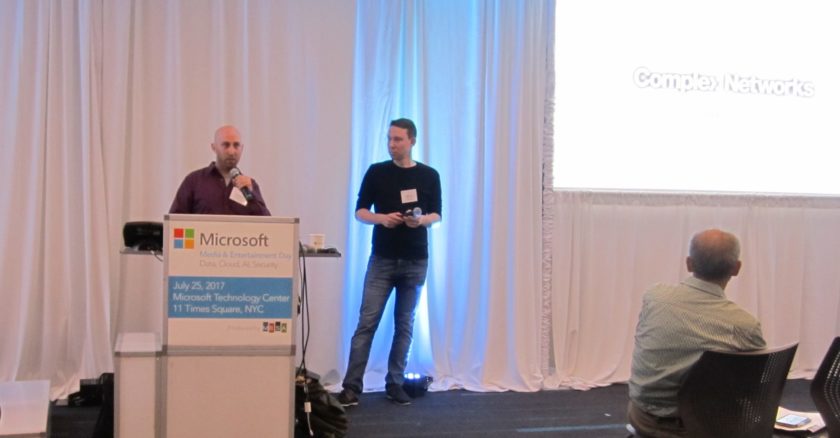Exclusives

Microsoft Senior Engineer: Azure’s Custom Decision Service Going Strong
Story Highlights
NEW YORK — There’s been “very strong results” initially for Microsoft Azure’s Custom Decision Service (CDS), according to Markus Cozowicz, Microsoft senior research software development engineer.
The CDS cloud-based, contextual decision-making application program interface (API) was announced by Microsoft at its Build 2017 conference in Seattle May 10. One of several new artificial intelligence (AI)-based cognitive services the company introduced at the time, CDS aims to help web site developers create intelligent systems using the power of reinforcement learning that adapts content in an application to maximize user engagement, according to the company. The CDS system incorporates user feedback into its decisions in real time and responds to emergent trends and breaking stories within minutes, it said.
CDS has been used at Microsoft’s MSN.com web site and by millennial-focused multimedia company Complex Media, with promising results, Cozowicz said at Microsoft’s AI, Machine Learning and Bots conference at the Microsoft Technology Center July 25.
At MSN.com, “when we started off, I think, two years ago, the task was to personalize the news” for people looking at the site’s news, he explained. The system can learn from clicks users make at a web site and any metric that the user can report to it, and can then optimize that information, he said.
Users can currently get a free trial of the service, he said, adding: “We want to see a lot of traffic coming in, and the more we have, the better the machine learning can become.”
In addition to personalizing articles on a news web site, other common-use cases for CDS include personalizing ad placements or web pages that an ad directs to, personalizing video content on a media portal, and recommending items on a shopping site, according to Microsoft Azure.
Complex Media has been working with CDS since about June-July of last year, prior to the public announcement about it, Jonathan Crockett, director of R&D at Complex Media, said at the July 25 event. His company started as a magazine with a web site and is “kind of pivoting heavily towards video” now, he said, noting that it “reaches millions of people a month.” His company is competing in a “fragmented” market on the Internet that also includes Facebook, Instagram, Snapchat, Twitter and others, and “I’m sure there’ll be more” competition, he predicted.
“Our problem is that users are increasingly consuming content off the web platform and this content they’re consuming” is machine learning-generated, “so they’re getting served content by algorithms already,” he said. Therefore, his company’s challenge was to get smarter about recommending content to users to enhance engagement on the Complex Media Web platform, he explained.
Crockett cited three main challenges his company is facing: conversions, responsiveness and experimentation. The dominance of mobile platforms means you can’t just put lots of content on a web page and leave it to people to choose the content on their own, he said, adding that users’ shorter attention spans mean they will flee a Web site quickly and go somewhere else if they don’t see the kind of content that interest them. In addition, he said, the news cycle is “now minutes” long and an AI system — if designed right — can sense when something has changed and can also tell when to place the right content in front of a user. “Probably the most difficult challenge,” meanwhile, is learning how to be good at all this, he said, noting that “the books are still being written” on the subject.
Crockett stressed that machine learning should be used “as an investment and not a magic bullet,” saying that the technology is “going to improve relative to what you have and how well you design it.” He added that it makes sense for a company experimenting with CDS to “set the expectation that this is something that will take … time,” so organizations should “start simple and realize that you’ll probably have to do some iteration and tweaking of features.”
It’s also important that organizations experimenting with CDS have a “sterile testing environment” without legacy codes and widgets to get in the way, he said, adding that they should “be OK with experimentation and learning. Those using CDS should “choose your action sets wisely” because “what we learned is it’s only going to really work well” based on the choices that the user gives it, he said.
More than 300 people in the media and entertainment sector attended the inaugural Microsoft Media & Entertainment Day, which AI, Machine Learning and Bots was part of. Produced by MESA, the event featured four half-day event programs that, in addition to AI, machine learning and bots, also covered content protection, video in the cloud and metadata’s place in the content lifecycle.









